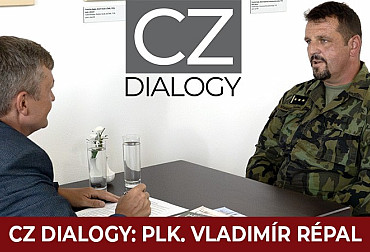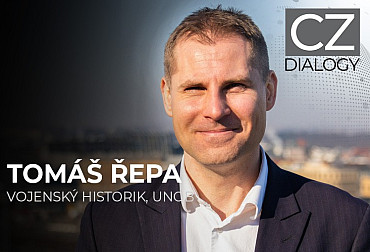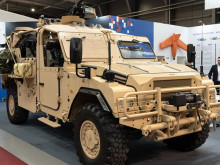Gen. Miroslav Hlaváč: Soldier should still have a decisive role
The cooperation between the Czech Army and the Czech Technical University (CTU) is now in full swing after the signing of a memorandum in April. In December, the first meetings of working groups composed of CTU experts, representatives of the General Staff of the Czech Army and the Ministry of Defence took place.This was the Structured Scientific Research Dialogue between CTU and the General Staff of the Czech Army. The Army has started a major modernisation for the next seven-year period. In the next part of our discussion programme CZ DIALOGUES, the first deputy chief of the General Staff of the Czech Armed Forces, Lieutenant General Miroslav Hlaváč, talks about the scope and intensity of the cooperation between the Czech Army and universities and the scientific community.
Video: Interview with First Deputy Chief of the General Staff of the Czech Armed Forces Lieutenant General Miroslav Hlaváč / CZ DEFENCE
According to the First Deputy Chief of the General Staff, cooperation with universities is natural as the army acquires increasingly sophisticated weapon systems. If the army wants to use these weapons to fulfil its tasks to ensure the defence of the Czech Republic and its commitments to the Alliance, it must form a single functional unit. "We have realised that with the capabilities that the army has, we will need outside help. That's why we decided to ask our universities to help us in integrating these weapon systems into one functional unit. Of course, the first thing we thought of was the Czech Technical University," explains Lieutenant General Hlaváč, adding that the CTU is a top institution not only in the Czech Republic, but also abroad.
According to Miroslav Hlaváč, the potential of the CTU is huge, not only in terms of academics, but especially in terms of 19,000 students, which is a huge thinking power. The December meeting was not the first activity that took place after the aforementioned signing of the memorandum between the Czech Republic and the CTU. It was preceded by various workshops and consultations, culminating in the aforementioned meeting with the university's leadership, including all the deans of the CTU faculties. The Czech Technical University is interested in cooperation and wants to help us achieve our goals. They also see this as an opportunity for the development of their capacities. When we started this dialogue with the rector, he said that they are doing this not only because of what I mentioned, but also because they are patriotic and realize that the army is an integral part of the state," said Lt. Gen.
The directions of cooperation and the foundations of the tasks of cooperation between the Czech Armed Forces and the CTU are already evident today. These are tasks and solutions that are related to big data processing, quantum technology and new materials. "I would add 3D printing, biotechnology and others. We have identified the topics, the areas, we have presented them to all the deans and researchers and now there will be a working-level development of these topics, where academics will tell us where they see opportunities for developing our capabilities and possible collaboration. And we expect that early next year we would present the individual projects," Lt Gen Hlaváč plans.
One of the announced projects was the data processing of the F-35 aircraft when the memorandum of cooperation between CTU and the Czech Army was signed. According to General Hlaváč, the work on this topic corresponds to the status and situation. "As far as the introduction of the F-35 is concerned, the project is still being prepared and of course we see this as one possibility of cooperation in connection with the use of processing of large amounts of data, the use of artificial intelligence and of course cooperation on the combat operation of the aircraft in cooperation with unmanned systems. We see a great opportunity there," said Lt Gen Hlaváč.
Within the possible directions of cooperation, it is not only about the implementation of specific projects, but also about the training of soldiers and commanders. "We have identified this as one of the areas and one of the objectives of this cooperation. In this way, people who will be involved in breakthrough technologies and, of course, our commanders and staff would be educated," says the First Deputy Chief of the General Staff.
Artificial intelligence is an increasingly discussed topic, and the military must have this capability at its disposal. "The first is combat or operational. When you see all the new weapon systems, where every soldier is a sensor, there's a huge amount of data that staffs and individual commanders receive and it's no longer in their power to be able to analyse it in real time and of course be able to take the necessary actions. We would like to use artificial intelligence in the conduct of combat operations and in the planning and decision-making process. The second such opportunity where we see the use of AI is in day-to-day activities, whether it is, say, data collection in the use of technology in logistics, in HR. And then of course it's in conducting training, education." However widely AI is currently discussed, it is certain that it will have a major impact in the military structure on command, control and other processes. According to General Hlaváč, this is the future and the military cannot hesitate in implementing this capability. "If we are preparing for a clash with a technologically advanced adversary, that technologically advanced adversary is not sleeping either. That's why we need to introduce artificial intelligence. Of course, there's a second thing where artificial intelligence will be stopped. We also have to deal with the fact that artificial intelligence might decide to use the lethal capabilities of the Army of the Czech Republic, and there we say that there must be a "red button" when the commander decides to stop the process," Lt. Gen. It should be remembered that the adversary will work with similar equipment in the future. The introduction of artificial intelligence brings with it not only changes in the military, but especially in the legislation, which will bring requirements for legislative changes.

The need for scientific cooperation with the army has been discussed for a long time, which was expressed, among other things, at the recent Command Assembly of the Chief of the General Staff of the Czech Armed Forces, Lieutenant General Karel Rehka, in the presence of President of the Republic Petr Pavel. The results of the orientation should also appear in the approved Concept of Construction of the Army of the Czech Republic until 2035. "I expect that by the end of the year the concept of the construction of the Army of the Czech Republic will be approved and, of course, presented to the general and professional public. We assume that we will explain it. But the concept of the construction of the Czech Army does not deal with specific topics or projects. It sets the goals and direction of construction. One of the six goals set out in this concept until 2035 is the introduction of modern technologies, and this provides the basis for this cooperation with the Czech Technical University," explains Lieutenant General Hlaváč.
One of the goals of the Czech Armed Forces is also the development of the space domain. According to General Hlaváč, it will depend on the possibilities and forms of cooperation within the development of the issue. In addition to space, it is also necessary to focus on cyber operations. "We don't want to just pay lip service to the introduction of new technologies. That's why we will create an experimental technology battalion," Lt Gen Hlaváč said. "This unit will test new technologies and weapon systems. Of course, it won't be in a year, but in the medium term it could be a battalion under construction, based on new systems, robotic weapons and breakthrough technologies. With this project, we want to connect the present with the future. At the same time, we want to have space for testing, trials and experimentation," General Hlaváč plans.
Another important point is the financing of the cooperation. "That is my role, to find a solution. We want to find a system that will be more flexible and fit for the times. We will not wait two years to implement a research project," says Lt. Gen. Hlaváč.
We wondered what role the soldier will play in an environment of sophisticated technology, artificial intelligence and new approaches to national defence and combat. "I would like to say that the soldier should still have a decisive role. If we want to use weapons against humans, then the soldier must have a decisive role," said First Deputy Chief of the General Staff of the Czech Armed Forces Lieutenant General Miroslav Hlaváč in the CZ DIALOGUES discussion programme. If you want to learn more, listen to the full interview at the beginning of this article.






















